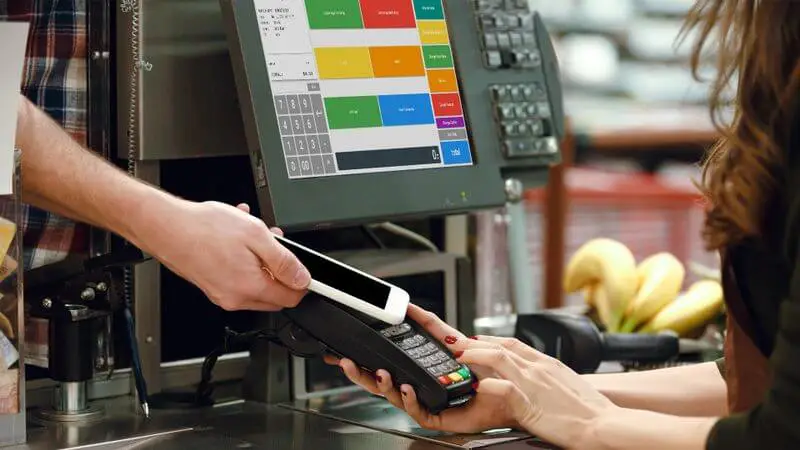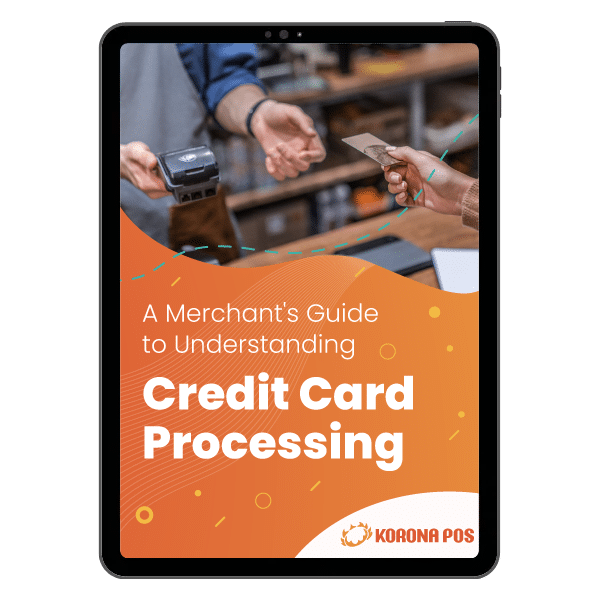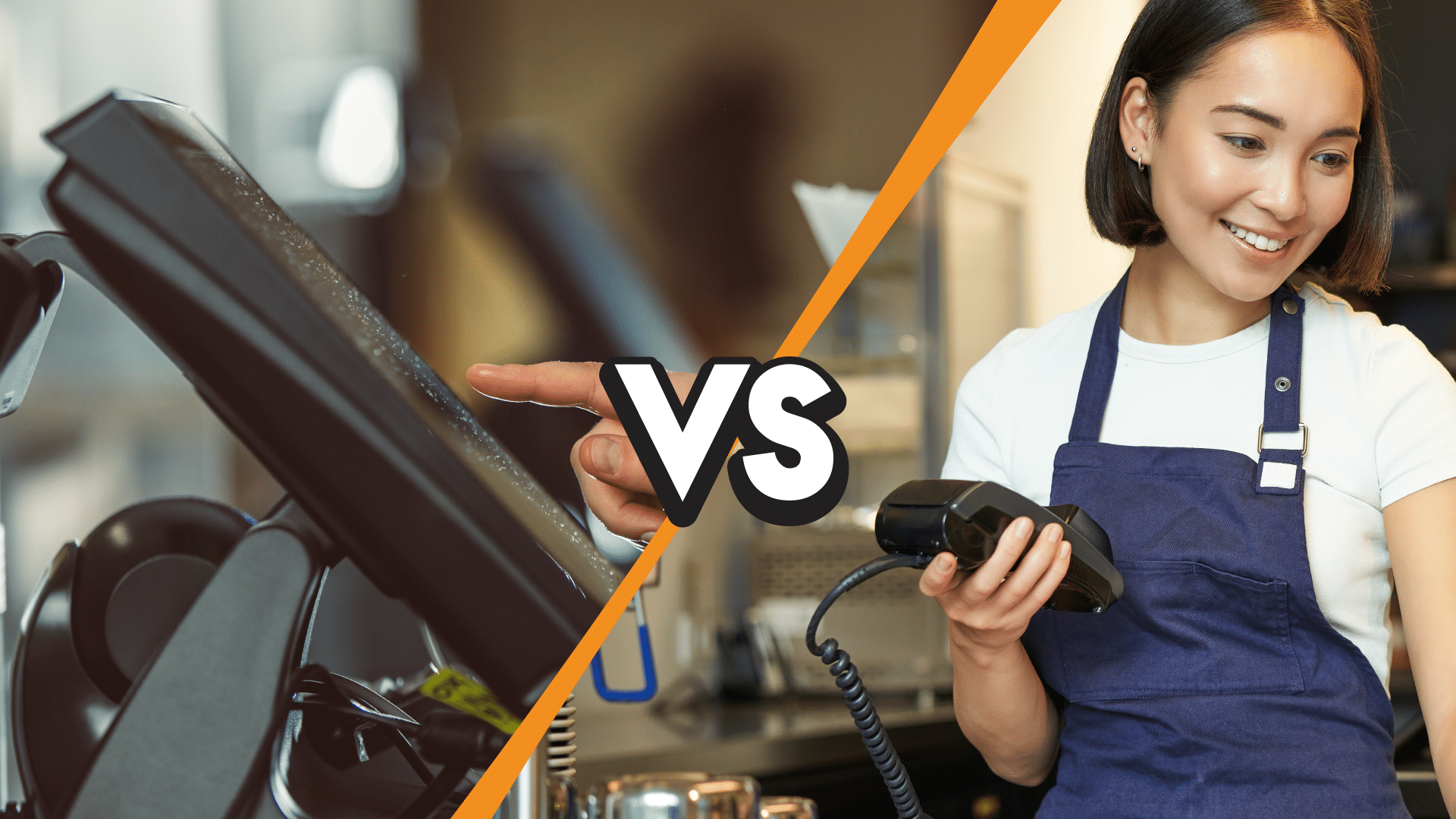
If you’re on the hunt for a point of sale provider, that means you’ll have to deal with a merchant services provider, too. You need both to run a retail business after all
We’ll walk you through the differences between merchant services and POS systems, other important terms you need to know about, and how all this information affects the choice of a POS system provider.
1. Key Differences
Aspect | POS Services | Merchant Services |
Definition | A point of sale (POS) system is a combination of software and hardware that allows businesses to accept payments and perform various business operations. | Merchant services encompass the services and equipment used by businesses to accept and process payments, primarily via credit cards, debit cards, and electronic payment methods. |
Functionality | POS systems focus on facilitating transactions at the point of sale, offering features like receipt printing, sales tracking, inventory management, and loyalty programs. They are often cloud-based, allowing remote access to transaction data. | Merchant services cover the broader spectrum of financial transaction facilitation, including authorizing and processing transactions, collecting funds from the issuing bank, and transferring funds to the merchant's account while deducting fees. |
Components | POS systems include software and hardware installed at the cash wrap counter or digitally through eCommerce platforms. | Merchant services consist of a payment processor, a merchant account, a payment gateway, and a credit card processing terminal. |
Payment Processing | POS systems may integrate with various payment processors, allowing businesses to choose a processor that suits their needs. | Merchant services, provided by banks or dedicated processors, involve the complete cycle of transaction processing, from authorization to fund transfer and encompass the back-end operations. |
Schedule a KORONA POS Demo Today
Speak with a product specialist and learn how KORONA POS can power your business needs.
2. Defining a POS System
A point of sale system or POS system is a combination of software and hardware. It’s installed at the cash wrap counter (or digitally through an eCommerce checkout page) and allows businesses to accept payments from customers for goods and services.
The best POS systems do more than just record sales and process returns. They print receipts, track sales, keep track of your inventory, provide information about your business performance, and help you launch and manage a loyalty program.
The majority of point of sale systems are now cloud-based, meaning you can access all transactions and operations in your store without being present at your premises.
3. Defining Merchant Services
The term “merchant services” is often simply called credit card processing. It refers primarily to the services and equipment that B2C businesses rely on to accept and process payments from their customers via credit cards, debit cards, and electronic payment methods.
Banks typically provide merchant services through an account that the merchant opens to facilitate credit card processing. Merchant services are required to set up point of sale (POS) systems, online payment gateways, and eCommerce platforms.
Merchant services also sometimes refer broadly to the businesses that facilitate the transactions. Again, these businesses are also often referred to as credit card processors or, simply, processors. For their part, processors take a small percentage of each transaction.
4. Merchant Services You Need In a Store
When you turn to an experienced merchant services provider, you’ll need to be supported every step of the way as you implement this integral part of your business into your operations.
- A payment processor: A payment processor service provider handles the credit card transaction process by acting as an intermediary between the merchant and the financial institutions involved. The processor charges a small fee on each transaction. This cost varies between processing solutions, so choose a payment processor that is fair and transparent.
- A merchant account: Simply put, a merchant account is a commercial bank account that allows a business to accept and process electronic payment card transactions. Merchant accounts require a business to partner with an acquiring bank that helps facilitate all communications in an electronic payment transaction. Merchant account partnerships are also critical for online businesses.
- A payment gateway: Payment gateways read and transfer eCommerce payment information from a customer to a merchant’s bank account. Its purpose is to capture the data, ensure that funds are available, and get the merchant paid. All online businesses must establish a reliable and secure payment gateway through their website.
- A credit card processing terminal: The credit card processing terminal allows the merchant or customer to insert, swipe, or tap their payment method. They are typically connected to point of sale system through a simple payment integration.
Some businesses start by working first with a merchant service provider. In this case, they set up the business with their credit card processing and find a compatible POS solution. In other cases, businesses start with a POS solution and then find an integrated merchant service provider afterward.
Today, many POS and merchant service providers have combined their operations into one solution. While it’s perhaps more convenient to have a single system, this almost always comes at a premium: such solutions charge inflated processing rates, often costing businesses additional thousands of dollars each month.
5. Merchants Services And POS System From The Same Company: Pros and Cons
When it comes to choosing a merchant services provider and a POS system for your business, you have the option to go with a single company that offers both services or separate providers for each service.
There are advantages and disadvantages to both approaches, and the best choice will depend on your specific business needs and requirements. Here are some pros and cons to consider:
Pros
- Integration: Using the same company for both services typically ensures seamless integration between the merchant services and the POS system. This can streamline operations, reduce compatibility issues, and provide a more cohesive experience for your staff and customers.
- Bundled pricing: Some companies may offer bundled pricing or discounts when you purchase both merchant services and a POS system from them. This can potentially save you money compared to sourcing the services separately.
Cons
- Limited options: By limiting yourself to a single provider, you may miss out on specialized or more advanced features offered by separate, dedicated providers for merchant services or POS systems.
- Vendor lock-in: Using the same company for both services can create vendor lock-in, making it more difficult to switch providers in the future if better options become available or if you’re dissatisfied with the service.
- Pricing: While bundled pricing can sometimes be advantageous, it’s not always the case. Separate providers may offer more competitive pricing for their individual services.
- Lack of flexibility: A single provider may not be able to accommodate your specific business needs or customization requirements as effectively as separate providers that specialize in their respective areas.

Learn more about how credit card processing works and save your business money in this free eGuide.
6. Choosing the Right POS for Your Store
There are a few things to consider when choosing your POS provider. Ultimately, the decision comes down to the POS features, service, and POS system cost.
Features
There is a wide range of POS features that businesses must consider when shopping for their point of sale. These often include inventory management, product and sales reporting, employee management, customer relationship management, and many more. Make a list of your most important features prior to starting the shopping process.
Integrations
A good point of sale software should be able to offer you the integrations necessary for your specific business to function properly. Such POS integrations commonly enable eCommerce capabilities, accounting/payroll, scheduling, loyalty, and CRM solutions. Still, there are a variety of more niche integrations that many retailers look for.
Various Payment Types
Contactless payments are possible via most credit and debit cards. Your POS system should be able to accept Apple Pay and Google Pay. It should also accept other various devices that use near-field communication (NFC) or radio frequency identification (RFID). Mobile payments are payments made for a product or service through a portable electronic device such as a tablet or cell phone.
Mobile payment technology can also be enabled through payment facilitator applications such as PayPal and Venmo. A modern POS should accept a wide variety of payment methods to provide additional convenience for their customers.
Cost
Finally, the price matters. POS hardware and software come in a wide price range. Determine your budget beforehand. Part of the cost will be your credit card processing. While there are some ways to lower your fees, the most important step is finding a fair and reliable merchant service provider.
KORONA POS is one of the few remaining points of sale solutions that allow businesses to choose any major credit card processing solution.
Having such a choice allows them to find more affordable options, avoid long-term contracts, and negotiate against fees and surcharges. Click below to learn more about credit card processing cost comparison with KORONA POS.
Are payment processors
giving you trouble?
We won’t. KORONA POS is not a payment processor. That means we’ll always find the best payment provider for your business’s needs.
7. Choosing the Right Merchant Services Provider
Choosing the right merchant services provider is crucial for any business that accepts credit card payments. Here are some key factors to consider when selecting a merchant services provider:
Pricing structure
- Understand the different pricing models, such as flat-rate, interchange-plus, and tiered pricing.
- Compare the rates and fees charged by different providers, including transaction fees, monthly fees, and additional charges.
- Look for transparent and reasonable pricing without hidden fees.
Payment processing solutions
- Ensure that the provider offers the payment processing solutions you need, such as in-person (card-present), online (card-not-present), mobile, and recurring billing.
- Consider the types of payments accepted (e.g., credit cards, debit cards, digital wallets).
- Check if the provider supports multiple currencies if you have international customers.
Integration and compatibility
- If you have an existing POS system or eCommerce platform, ensure that the merchant services provider integrates seamlessly with your systems.
- Check if the provider offers APIs or plugins for easy integration.
Security and compliance
- Look for a provider that adheres to the Payment Card Industry Data Security Standard (PCI DSS) and offers secure payment processing solutions.
- Ensure that the provider provides fraud detection and prevention tools to protect your business and customers.
Customer support
- Evaluate the quality of customer support offered by the provider, including response times, availability, and communication channels.
- Look for providers with knowledgeable and responsive support teams.
Contract terms and conditions
- Carefully review the contract terms and conditions, including any early termination fees, automatic renewal clauses, and other potential hidden costs.
- Understand the provider’s policies on account holds, reserves, and funding times.
8. Understanding Payment Processing Pricing
With that in mind, let’s briefly go over how payment processing fees are typically broken down.
Interchange-plus pricing
Credit card issuers, such as Mastercard and Visa, charge specific interchange rates for each type of card based on the factors mentioned earlier. Interchange-plus pricing structure allows the processor to add a small margin to the interchange for each sale.
This model is the most transparent because it allows retailers to see exactly how much of their processing cost is going to the merchant service provider.
All other plans bundle this cost with the interchange and network fees, thereby making it difficult to understand what they’re paying for and who the money is going to. Because of its transparency, this pricing structure is almost universally the best option for businesses.
Flat-rate
This pricing model is suitable for small retail businesses and startups with low sales volume. The flat-rate is a fixed percentage based on each charge. It is quick and easy to set up. It has the best ease of use, though the rate is typically slightly higher than the more transparent interchange-plus pricing.
Tiered rates
This option is not the most appropriate for those running small businesses and medium-sized businesses because fees fluctuate. Tiered rates are grouped into different structures that separate each card type (Visa, Mastercard, Discover). In the end, merchants are left with little transparency and elevated rates.
Direct interchange
With a direct interchange fee, the merchant charges a one-time monthly fee with no percentage with a direct interchange fee. This is rarely a wise solution, but it may be a feasible option for businesses that have a high volume of low transactional values.
FAQs: POS Systems vs Merchant Services
- What is a POS merchant system?
A merchant point of sale system is a system that offers integrations with payment processors. These send the value of a purchase to your card reader when you click the “pay” button, so you don’t have to enter it yourself. It quickly processes and completes transactions.
- What is the difference between POS and terminal?
As opposed to a traditional terminal, a point of sale system can perform multiple tasks and improve the operation of your business. In addition, they offer a level of analysis that a regular terminal cannot. The effective use of a POS system enables your business to run smoothly, such as inventory control, loyalty programs, customers’ checkout experience, etc.
- What is the difference between a payment processor and a merchant account?
A payment processor and a merchant account are two different things. A payment processor facilitates online and in-person transactions, while a merchant account is a deposit account where those payments are first deposited into your regular bank account.
- What is a POS transaction?
A point of sale transaction is the point at which a transaction is finalized or the point at which a customer makes a payment in exchange for goods and services. Any payment method can be used, such as cash, debit cards, credit cards, mobile payments, and even accumulated loyalty points to complete transactions.
POS Systems vs. Merchant Services: Wrapping Up
POS services refer to the software and hardware used by businesses to manage sales transactions and inventory. On the other hand, merchant services encompass the various services and equipment required to accept and process different payment methods, particularly credit and debit cards.
KORONA POS is a cloud-based POS that serves as a point of sale software for retail stores such as convenience stores, vape shops, liquor stores, coffee shops, museums, etc. It’s one of the few POS software that integrates with any payment processor of your choice. With KORONA POS, you’ll get the flexibility you need and make your choice based on your budget.
In addition to the product, KORONA POS provides you with all the information and the team you need to help make the whole process smooth and easy. Click below to learn more.












